|
|
|
Sort Order |
|
|
|
Items / Page
|
|
|
|
|
|
|
| Srl | Item |
| 1 |
ID:
025707
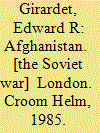

|
|
|
|
|
| Publication |
London, Croom Helm, 1985.
|
| Description |
259p.hbk
|
| Standard Number |
0709938020
|
|
|
|
|
|
|
|
|
|
|
|
Copies: C:1/I:0,R:0,Q:0
Circulation
| Accession# | Call# | Current Location | Status | Policy | Location |
| 026423 | 958.1045/GIR 026423 | Main | On Shelf | General | |
|
|
|
|
| 2 |
ID:
141986
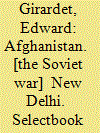

|
|
|
|
|
| Publication |
New Delhi, Selectbook service syndicate, 1986.
|
| Description |
259p.hbk
|
|
|
|
|
|
|
|
|
|
|
|
Copies: C:1/I:0,R:0,Q:0
Circulation
| Accession# | Call# | Current Location | Status | Policy | Location |
| 027492 | 958.104/GIR 027492 | Main | On Shelf | General | |
|
|
|
|
| 3 |
ID:
106604


|
|
|
|
|
| Publication |
2011.
|
| Summary/Abstract |
This article sheds light on the identity and activities of foreign fighters who were active in Afghanistan and Pakistan between 2002 and 2006. This is done through analyzing a series of "martyr biographies"-short biographical stories of killed militants-issued by the Al Qaeda network in 2008. The study argues that there was little migration of foreign fighters from abroad to Afghanistan and Pakistan in this period, and practically no influx of fighters from Iraq. Al Qaeda's activities in the region were upheld by fighters who managed to flee from Afghanistan during and after the U.S.-led invasion in late 2001. After re-settling in the tribal areas of Pakistan, the main concern for these fighters was to fight a guerrilla war against U.S. and NATO troops in Afghanistan, not to plot terrorist attacks in Western countries. The study demonstrates that over time, the foreign fighters became more integrated in local communities. These early developments may help to explain why Al Qaeda continues to enjoy a strong sanctuary in the tribal areas of Pakistan today.
|
|
|
|
|
|
|
|
|
|
|
|
|
|
|
|
| 4 |
ID:
027064
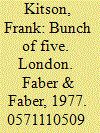

|
|
|
|
|
| Publication |
London, Faber & Faber, 1977.
|
| Description |
xiii, 306p.
|
| Standard Number |
0571110509
|
|
|
|
|
|
|
|
|
|
|
|
Copies: C:1/I:0,R:0,Q:0
Circulation
| Accession# | Call# | Current Location | Status | Policy | Location |
| 016867 | 355.0218/KIT 016867 | Main | On Shelf | General | |
|
|
|
|
| 5 |
ID:
122123
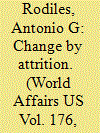

|
|
|
|
|
| Publication |
2013.
|
| Summary/Abstract |
Five years ago, hopes were high among Cuba watchers when Raúl Castro officially succeeded Fidel. There was particularly intense speculation about who would be named the next first vice president of the Council of State. Bets focused on two candidates: Carlos Lage Dávila, a bureaucrat in his late fifties, and José Ramón Machado Ventura, an apparatchik in his late seventies who had been a captain in the guerrilla war that brought the revolution to power in 1958. Which of the two men was chosen, observers theorized, would suggest Raúl Castro's orientation over the next five years and give a clue about whether Cuba's course would be Raulista (reformist) or Fidelista (status quo).
|
|
|
|
|
|
|
|
|
|
|
|
|
|
|
|
| 6 |
ID:
131980
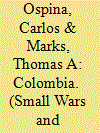

|
|
|
|
|
| Publication |
2014.
|
| Summary/Abstract |
From 1965 to the present, Colombia has been confronted by the insurgency of the Revolutionary Armed Forces of Colombia (FARC). The threat reached a new level in 1996 with the advent of mobile warfare, whereby large units sought to neutralize the military in an effort to seize power and institute a Marxist-Leninist regime. Unlike Vietnam, what followed was a regaining of the strategic initiative by the government and a decimation of the insurgent threat. This was accomplished with US assistance but from first to last was driven by Colombian leadership and strategy. The strategy which led to this signal change, 'Democratic Security', unfolded under the leadership of President Álvaro Uribe. It was a civil-military partnership, which sought to expand the writ of Colombian democracy to all elements of society. Securing the population provided the shield behind which economic, social, and political life could occur as driven by the will of the people. It was the agreement upon legitimacy as the strategic goal and reform as the route to that goal which allowed the Colombians and the Americans to work so well together.
|
|
|
|
|
|
|
|
|
|
|
|
|
|
|
|
| 7 |
ID:
128228
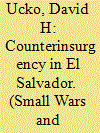

|
|
|
|
|
| Publication |
2013.
|
| Summary/Abstract |
Following two frustrating counterinsurgency campaigns in Iraq and Afghanistan, there is a drive to find new and more viable ways of addressing irregular security challenges. In this effort, the 1980s' campaign in El Salvador has gained prominence, as it resulted in the defeat of the guerrilla adversary yet involved only a modest deployment of US personnel and resources. The use of history to search for models and precedents can be fruitful, but past conflicts must be understood on their own terms and not made to fit the preconceived ideas of the day. A deeper appreciation of what happened in El Salvador reveals not only the unique circumstances that shaped the campaign but also the limited results of the counterinsurgency program to which the war's outcome is now being ascribed. This article adopts a broader lens, focusing on the real yet undervalued factors that produced peace in El Salvador and whether the final outcome was truly quite as successful as is now commonly assumed.
|
|
|
|
|
|
|
|
|
|
|
|
|
|
|
|
| 8 |
ID:
047046
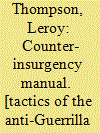

|
|
|
|
|
| Publication |
London, Greenhill Books, 2002.
|
| Description |
176p.
|
| Standard Number |
1853675024
|
|
|
|
|
|
|
|
|
|
|
|
Copies: C:1/I:0,R:0,Q:0
Circulation
| Accession# | Call# | Current Location | Status | Policy | Location |
| 046700 | 363.32/THO 046700 | Main | On Shelf | General | |
|
|
|
|
| 9 |
ID:
117634
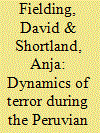

|
|
|
|
|
| Publication |
2012.
|
| Summary/Abstract |
The international community has a declared intention to protect civilians from deliberate violence in civil conflicts. The optimal type of foreign intervention and its optimal timing are likely to depend on the combat strategies of the belligerents. Weak belligerents unable to provide economic incentives and security guarantees to civilians often follow a strategy of intimidation and terror. In this case, foreign financial support for one side could affect the strategies of both sides in several different ways, and the interaction between the two sides' strategies could magnify the resulting impact on civilian casualties. Using a new monthly time-series dataset, we explore the factors associated with variations in the intensity of civilian abuse by participants in the guerrilla war in Peru during the 1980s and 1990s. We show that an increase in civilian abuse by one side was strongly associated with subsequent increases in abuse by the other. In this type of war, foreign intervention could substantially reduce the impact on civilians of a sudden rise in conflict intensity, by moderating the resulting 'cycle of violence'. In practice, foreign interventions had a mixed record in Peru: financial support for the Peruvian military raised the level of violence against civilians, but counter-narcotics aid and development aid reduced it. These effects are consistent with a model in which different types of intervention have different effects on belligerents' resource capacity and on the opportunity cost of fighting.
|
|
|
|
|
|
|
|
|
|
|
|
|
|
|
|
| 10 |
ID:
030000
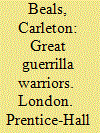

|
|
|
|
|
| Publication |
London, Prentice-Hall Inc., 1970.
|
| Description |
246p.
|
| Standard Number |
133688618
|
|
|
|
|
|
|
|
|
|
|
|
Copies: C:1/I:0,R:0,Q:0
Circulation
| Accession# | Call# | Current Location | Status | Policy | Location |
| 004026 | 355.0218/BEA 004026 | Main | On Shelf | General | |
|
|
|
|
| 11 |
ID:
027098
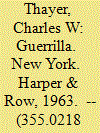

|
|
|
|
|
| Publication |
New York, Harper & Row, 1963.
|
| Description |
xxiv, 195p.
|
|
|
|
|
|
|
|
|
|
|
|
Copies: C:1/I:0,R:0,Q:0
Circulation
| Accession# | Call# | Current Location | Status | Policy | Location |
| 000675 | 355.0218/THA 000675 | Main | On Shelf | General | |
|
|
|
|
| 12 |
ID:
058666
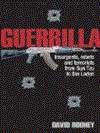

|
|
|
|
|
| Publication |
London, Brassey's, 2004.
|
| Description |
252p.
|
| Standard Number |
1857533526
|
|
|
|
|
|
|
|
|
|
|
|
Copies: C:1/I:0,R:0,Q:0
Circulation
| Accession# | Call# | Current Location | Status | Policy | Location |
| 049101 | 355.0218/ROO 049101 | Main | On Shelf | General | |
|
|
|
|
| 13 |
ID:
133510
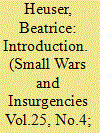

|
|
|
|
|
| Publication |
2014.
|
| Summary/Abstract |
When twentieth-century authors wrote about 'partisan warfare', they usually meant an insurgency or asymmetric military operations conducted against a superior force by small bands of ideologically driven irregular fighters. By contrast, originally (i.e. before the French Revolution) 'partisan' in French, English, and German referred only to the leader of a detachment of special forces (party, partie, Parthey, détachement) which the major European powers used to conduct special operations alongside their regular forces. Such special operations were the classic definition of 'small war' (petite guerre) in the late seventeenth and in the eighteenth centuries. The Spanish word 'la guerrilla', meaning nothing other than 'small war', only acquired an association with rebellion with the Spanish War of Independence against Napoleon. Even after this, however, armies throughout the world have continued to employ special forces. In the late nineteenth century, their operations have still been referred to as prosecuting 'la guerrilla' or 'small war', which existed side by side with, and was often mixed with, 'people's war' or popular uprisings against hated regimes.
|
|
|
|
|
|
|
|
|
|
|
|
|
|
|
|
| 14 |
ID:
134175
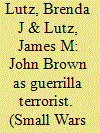

|
|
|
|
|
| Publication |
2014.
|
| Summary/Abstract |
John Brown is usually not considered to have been a terrorist, and even recent analyses of his activities consider him to be a guerrilla fighter or insurgent in his activities in Kansas. Brown, however, meets the criteria of a terrorist more than a guerrilla fighter when his activities in the Kansas Territory are considered. His raid on Harpers Ferry, however, is more in line with guerrilla operations or insurgent activities.
|
|
|
|
|
|
|
|
|
|
|
|
|
|
|
|
| 15 |
ID:
104755
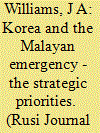

|
|
|
| 16 |
ID:
118886
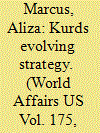

|
|
|
| 17 |
ID:
078957
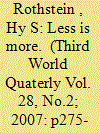

|
|
|
|
|
| Publication |
2007.
|
| Summary/Abstract |
US success against irregular threats is inversely related to the priority senior US officials (civilian and military) attach to the effort. When one investigates the return on investment in the global war on terror (gwot), now increasingly described as the Long War, in Iraq versus in the Philippines, it is clear that US efforts in the Philippines are achieving great success with minimal resources, while efforts in Iraq are achieving limited success with almost unlimited resources. The same is true of US success against an irregular threat in El Salvador in the 1980s. During that period the focus of US military attention was in Europe. El Salvador was a backwater that was never of particularly great importance to the Pentagon. This paper will seek to understand why limited efforts against irregular threats seem to result in greater success than all-out efforts.
|
|
|
|
|
|
|
|
|
|
|
|
|
|
|
|
| 18 |
ID:
107897
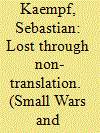

|
|
|
|
|
| Publication |
2011.
|
| Summary/Abstract |
While Carl von Clausewitz has generally been respected as one of the most profound philosophers of war, his expertise has been regarded as somewhat limited if not even irrelevant to the so-called 'new wars' of the post-Cold War world. Many scholars in international relations have claimed that 'new wars' are essentially 'post-Clausewitzian' and 'post-trinitarian' in nature, meaning that they are no longer fathomable through a Clausewitzian framework. However Clausewitz's earlier writings were nearly exclusively dedicated to guerrilla warfare, or what he called 'small wars'. These writings have been largely overlooked by many analysts of contemporary conflicts. By drawing on his rare and untranslated writings, the article uncovers a critical part of Clausewitz's expertise in asymmetric warfare and shows that, far from being irrelevant in an age where interstate warfare is increasingly being replaced by conflicts between states and semi-/non-state actors, Clausewitz's philosophical writings actually shed new light into the particular interactive dynamics generated during wars waged under conditions of asymmetry.
|
|
|
|
|
|
|
|
|
|
|
|
|
|
|
|
| 19 |
ID:
036626
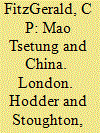

|
|
|
|
|
| Publication |
London, Hodder and Stoughton, 1976.
|
| Description |
vi, 166p.Hbk
|
| Standard Number |
0340190310
|
|
|
|
|
|
|
|
|
|
|
|
Copies: C:1/I:0,R:0,Q:0
Circulation
| Accession# | Call# | Current Location | Status | Policy | Location |
| 016565 | 923.151/FIT 016565 | Main | On Shelf | General | |
|
|
|
|
| 20 |
ID:
082991
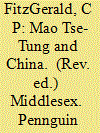

|
|
|
|
|
| Edition |
Rev. ed.
|
| Publication |
Middlesex, Pennguin Books, 1976.
|
| Description |
197p.pbk
|
|
|
|
|
|
|
|
|
|
|
|
Copies: C:1/I:0,R:0,Q:0
Circulation
| Accession# | Call# | Current Location | Status | Policy | Location |
| 053716 | 951.050924/FIT 053716 | Main | On Shelf | General | |
|
|
|
|
|
|
|
|
|